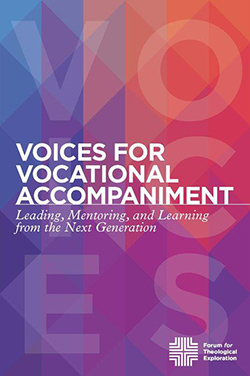For communities across the United States, 2020 was quite the year. The global COVID-19 pandemic raged. Racial justice uprisings called attention to police and state violence following the murder of George Floyd. Our political landscape became increasingly polarized and fraught. All this together leaves little doubt that history books will be processing for many years to come the experiences we are living through now.
Against the chaotic backdrop of a world made undone, we as Christians are called to be messengers of radical hope. Ours is a resurrection hope that can see possibility where others see insurmountable challenge, to see new life where others see death. I believe in my core that the Gospel invites us into a place of imagination as active participants in God’s larger work of justice and reconciliation.
The hard work of this moment is to create space to become quiet enough to discern how God is uniquely calling you to respond in this season.
In 2015, my friend Nicholas Hayes and I created and piloted a resource dedicated to helping young people leverage their life story as a roadmap for vocational discernment. To us, vocation is not synonymous with a job or role. Vocation, in our understanding, is a matter of articulating your prophetic purpose in your own words.

In today’s lingo, “prophecy” is often associated with predicting the future. But in the biblical tradition, a prophet is someone uniquely attuned to the present, one who reads the signs of the times. More specifically, the prophet gives voice to the tension between the world as it is now and the world as God dreams it to be. A prophet clearly sees and feels the brokenness — the injustice — of the world as it is. But a prophet also keeps faith in the potential for the world to be healed and transformed by the coming of God’s justice. Anger and grief, on the one hand, and passionate hope, on the other, are the two sides of prophecy.
Each of us has a prophetic vocation. We are called collectively to live in spaces of grief and hope, so that we might become partners in God’s work of justice and reconciliation. Yet each of us also has a unique role to play. To find it, we must read the signs of the times for ourselves and discern where the Spirit most moves each of us to act. What specific part of the world’s brokenness most speaks to you? To your own passions, griefs, hopes? Where do you feel most called to do the work of justice?
A key insight we gleaned as we piloted this project with young adults is this: While one’s job or role can change, their prophetic purpose often remains consistent over the course of a lifetime. Discovering our prophetic purpose anchors us in our ability to reflect and understand our own story and the stories of the people, places, and communities that have helped shape us along the way.
The Bible is full of famous prophetic call stories, from the uncertainty and reluctance of Jeremiah (Jeremiah 1:4-19) to the supernatural splendor of Isaiah (Isaiah 6:1-8). Most often these narratives involve the prophet hearing the audible voice of God and being directly commissioned into service. Sometimes our prophetic purpose is revealed through these obviously spiritual experiences, like those recounted by the biblical prophets. But more often, it comes from the powerful, everyday experiences that “wake us up” to the brokenness of the world. One way, then, to understand our prophetic purpose is to look at the ways God calls us in those moments of awakening and respond to that call through the choices we make.
As you begin to explore your prophetic purpose through the moments that shaped and still shape you, here are a few questions that might be helpful:
- When was your first experience of injustice? How did the experience change your worldview?
- Describe a moment, recent or long past, when you witnessed an act of injustice that broke your heart. How did you respond to your anger?
- When was a time you believed you could make a difference on the issue that broke your heart? What actions did you take? How did you know God or others were with you?
When we take the time to examine these transformative moments of call and response that have inspired us, we see themes emerge. Perhaps you have always had a passion for caring for God’s creation, or for offering radical hospitality to strangers. Maybe you have always had a tendency to speak up for those denied a voice in certain halls of power. Whatever it is, know that God is with you and will never leave or forsake you.
Finally, a word on roles. In my own ministerial journey, I find that making the distinction between prophetic purpose and role is incredibly important — even liberating. Societal norms tie our sense of call to the jobs we hold. As a result, we allow our self-worth to be wrapped up in our ability to be productive in these positions. Some of us will be blessed to have these two things — our job and our prophetic purpose — align for a season. But in my lived experience, there are few things that are as certain as change. As we progress through the life cycle, our responsibilities and those to whom we are accountable will necessarily transition. Parental figures age. Our health status changes. We may choose to partner, raise children, or not. These life cycle shifts do not mean we need to abandon our prophetic purpose, but rather assess and discern how our purpose might be called to manifest differently in each new season. You might be called to the front lines of protest now, and into more of a support role later in life. It’s all okay.
One of the beautiful things about being a Christian is the constant reminder that it is not up to us alone to solve the great challenges of our time. Rather — as we seek our prophetic purpose amid the pandemics of virus, injustice, and political division — we might take solace in these words, often falsely attributed to the great freedom fighter Archbishop Oscar Romero:
We cannot do everything, and there is a sense of liberation in realizing that.
This enables us to do something, and to do it very well.
It may be incomplete, but it is a beginning, a step along the way, an opportunity for the Lord’s grace to enter and do the rest.
We may never see the end results, but that is the difference between the master builder and the worker.
We are workers, not master builders; ministers, not messiahs.
We are prophets of a future not our own.
[From a 1979 homily written for Cardinal John Dearden by the Rev. Kenneth Untener; quoted by Pope Francis in 2015]
May it be so. Amen.
From “Voices for Vocational Accompaniment: Leading, Mentoring, and Learning From the Next Generation” edited by Patrick B. Reyes. Copyright © 2021 by the Forum for Theological Exploration. Used by permission of the Forum for Theological Exploration.



















